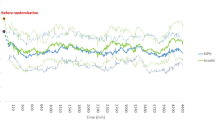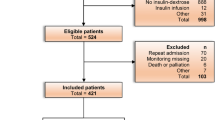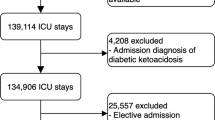Abstract
The risk of mortality or significant moridity is high among long-stay intensive care unit (ICU) patients. Sepsis, polyneuropathy and multiple organ failure are prominent causes of mortality and morbidity in the ICU. Many ICU patients are hyperglycaemic, presumably reflecting an adaptive development of insulin resistance. We hypothesized that this hyperglycaemia predisposes patients to many of the typical ICU complications, prolonged intensive care dependence and excess mortality. Insulin therapy directed at establishing normoglycaemia was investigated in a series of 1548 ICU patients. An intensive treatment group received insulin infusion tailored to control blood glucose levels in the range 4.4–6.1 mmol/l (80–110 mg/dl), whereas the conventional treatment group only received insulin when glucose levels exceeded 11.1 mmol/l (200 mg/dl) and in that event were maintained in a target range of 10.0–11.1 mmol/l (180–200 mg/dl). Intensive management of blood glucose levels was reflected in a 43% reduction in intensive care mortality risk (P=0.036 after correction for interim analyses) and a 34% reduction in hospital mortality (P=0.01). A reduced risk of infection was reflected in a 46% reduction in the risk of septicaemia (P=0.003) and a 35% reduction in the need for prolonged (>10 d) antibiotic therapy (P<0.001). Regression analysis suggests that control of glucose levels, rather than insulin administration itself, was responsible for the clinical benefits observed. Use of insulin infusion to control glucose levels in ICU patients, at least in populations similar to those in our study, can be expected to achieve clinically welcome improvements in outcome. An algorithm is proposed for implementing this. Further data are needed to establish the applicability of this strategy to other patient groups in the ICU and in general hospital care.
This is a preview of subscription content, access via your institution
Access options
Subscribe to this journal
Receive 12 print issues and online access
$259.00 per year
only $21.58 per issue
Buy this article
- Purchase on Springer Link
- Instant access to full article PDF
Prices may be subject to local taxes which are calculated during checkout
Similar content being viewed by others
Author information
Authors and Affiliations
Corresponding author
Rights and permissions
About this article
Cite this article
Van den Berghe, G. Beyond diabetes: saving lives with insulin in the ICU. Int J Obes 26 (Suppl 3), S3–S8 (2002). https://doi.org/10.1038/sj.ijo.0802171
Published:
Issue Date:
DOI: https://doi.org/10.1038/sj.ijo.0802171
Keywords
This article is cited by
-
Die Bedeutung von Laborleistungen in Notaufnahmen nach G‑AEP-Kriterien und beim Leitsymptom Dyspnoe
Notfall + Rettungsmedizin (2024)
-
Die Bedeutung von Laborleistungen bei der klinischen Notfallbehandlung in Notaufnahmen beim Leitsymptom „akuter Bauchschmerz“
Notfall + Rettungsmedizin (2023)
-
Association of multiple glycemic parameters at intensive care unit admission with mortality and clinical outcomes in critically ill patients
Scientific Reports (2019)
-
The new Surviving Sepsis Campaign recommendations on glucose control: reply to Schultz et al.
Intensive Care Medicine (2008)



